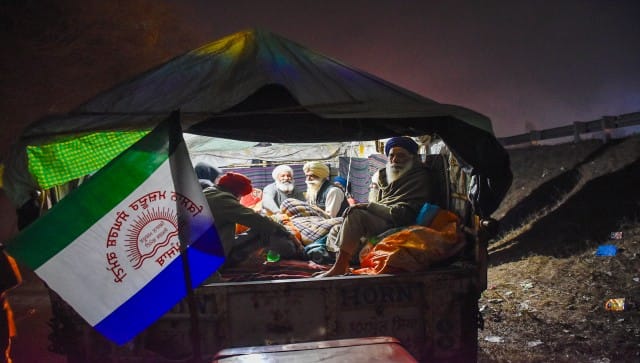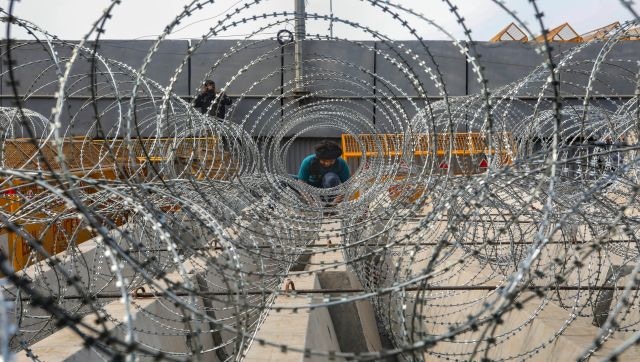After talks with Union ministers Piyush Goyal, Arjun Munda, and Nityanand Rai on Monday were inconclusive, over 200 farmers’ unions, including the Samyukta Kisan Morcha and the Kisan Mazdoor Morcha, are gearing up to take part in the “Delhi Chalo” march today. The police forces in the National Capital and all three states are also on high alert. The farmers are protesting over a series of demands, including a
minimum support price (MSP) for their crops — a follow-up to their 2020 protest in which they had camped at the border points for about 13 months, punishment for the culprits in the Lakhimpur Kheri incident, pensions for farmers beyond the age of 60, among others. From rations to diesel and trolleys,
thousands of farmers marching towards Delhi have prepared for the latest long haul. Let’s take a closer look. Farmers are all ready for the long haul Coordinator of KMM, Sarwan Singh Pandher, according to Indian Express, said, “Tractors in thousands will march from different parts of Punjab, reaching midway by Monday afternoon. Farmers will sleep overnight in their tractors on roadsides and will proceed towards Delhi based on the outcome of the talks.” Farmers claim that because the borders have been blocked off to keep them from accessing the Capital, they are carrying enough fuel and ration to survive for months. “From a needle to hammer, we have everything we need in our trolleys, including tools to break stones. We left our village with six month’s ration with us. We have enough diesel, even for our brothers from Haryana,” Harbhajan Singh, a farmer from Punjab’s Gurdaspur, headed to Delhi on his tractor, pulling two trollies loaded with supplies, told NDTV. [caption id=“attachment_13721512” align=“alignnone” width=“640”] Farmers arrive at the Shambhu border (Punjab-Haryana) for their ‘Delhi Chalo’ march, in Patiala district. PTI[/caption] While speaking to the newspaper, Tony Lehra, who hails from Bathinda’s Lehra Mohabbat village, said that villagers have donated rations for the farmers. “We have 24 quintals of wheat, 160 kg of wheat flour, 46 kg of rice, 20 kg of jaggery, around 10 kg of tea leaves, 16 kg of ghee, and various other ration items… all have been donated by villagers. The government should not underestimate us. Delhi 2.0 or Dilli Chalo will happen if demands are not met,” he said. According to Business Today, which cited intelligence report, tractors have been modified to convert them into shelters and stays. The report also claims farmers are planning to trickle in in small groups and seek shelter in gurudwaras, dharamshalas, ashrams, guest houses around Delhi. Kaka Singh Kotra, leader of Bharatiya Kisan Union (BKU) Sidhupur, added, “Our union operates from 19 districts of Punjab and a few trolleys from each district will go to Delhi if nothing comes out of the talks.” Singh, who was reportedly part of the 2020 farmers’ protest, said they won’t withdraw this time until their demands are met. “We didn’t budge through the 13 months last time. We were promised our demands would be met, but the government didn’t keep its promise. This time, we will leave only after all our demands are met,” he told NDTV. [caption id=“attachment_13721562” align=“alignnone” width=“640”]
 Farmers in a trolley ahead of their scheduled march towards Delhi, in Fatehgarh Sahib, Monday. PTI[/caption]
Farmers in a trolley ahead of their scheduled march towards Delhi, in Fatehgarh Sahib, Monday. PTI[/caption]
Also read: Also read: Drones, barriers & more: How Delhi-NCR has turned into a fortress to stop farmers’ march Why a legal guarantee of MSP is fraught with challenges
Unsuccessful talks with ministers Following the failure of late-night negotiations with a government team in Chandigarh, the farmers started their march this morning from Fatehgarh Sahib. In a last-ditch attempt to stop the “Delhi Chalo” march, two Union ministers met with the farmer leaders. This meeting resulted in an agreement to repeal the Electricity Act 2020, compensate farmers killed in Lakhimpur Kheri, Uttar Pradesh, and withdraw cases against farmers during the farmers’ movement. Three requests, however, could not be agreed upon: the implementation of the Swaminathan Commission’s recommendations, the enactment of a law guaranteeing an MSP for all crops, and farmers’ loan waiver. [caption id=“attachment_13716212” align=“alignnone” width=“640”] Farmers during a protest march to the national capital, in Noida, Thursday, 8 February 2024. PTI[/caption] Following a second round of meeting that lasted more than five hours with the Centre late on Monday, Sarwan Singh Pandher – general secretary of the Kisan Mazdoor Sangharsh Committee, said, “We do not think the government is serious about any of our demands. We do not think they want to fulfill our demands. Tomorrow, we will march towards Delhi at 10 am." However, Minister Arjun Munda also attended the second round of talks with the farm leaders, said a consensus was reached on most issues and a formula was proposed for resolving some others through the formation of a committee. “We are still hopeful that farmer bodies will hold talks. We will try to resolve issues in the coming days,” Munda said after the meeting. Delhi on alert Delhi has been fortified to stop the farmers from entering the city, with key border points - Ghazipur, Tikri and Singhu - barricaded. [caption id=“attachment_13717782” align=“alignnone” width=“640”]
 A worker lays down barbed wire on National Highway 44 in view of farmers’ ‘Delhi Chalo March’, near Singhu border in Sonipat district. PTI[/caption] Concrete blocks, iron nails, and walls of containers have been placed at border points to prevent tractors and trollies from crossing into the city. The Delhi police also stationed water cannons and sizable cement canisters near the Sonepat boundary. Large traffic jams caused by many diversions and police checkpoints have been reported from the border areas. An advisory was released by the Delhi Traffic Police on Sunday in advance of the farmers’ “Delhi Chalo” march. The police have instructed car owners to follow the advisory to remain aware of any traffic restrictions or diversions. In order to prevent farmer agitation,
Section 144 of the CrPC , which prohibits gatherings of five or more people, has been implemented in several districts of Haryana, Delhi and adjacent regions, Chandigarh, and Uttar Pradesh. The Haryana government has also suspended mobile internet services and bulk SMS in seven districts. The decision was made out of concerns about a potential disturbance of peace brought on by the planned march. With inputs from PTI
A worker lays down barbed wire on National Highway 44 in view of farmers’ ‘Delhi Chalo March’, near Singhu border in Sonipat district. PTI[/caption] Concrete blocks, iron nails, and walls of containers have been placed at border points to prevent tractors and trollies from crossing into the city. The Delhi police also stationed water cannons and sizable cement canisters near the Sonepat boundary. Large traffic jams caused by many diversions and police checkpoints have been reported from the border areas. An advisory was released by the Delhi Traffic Police on Sunday in advance of the farmers’ “Delhi Chalo” march. The police have instructed car owners to follow the advisory to remain aware of any traffic restrictions or diversions. In order to prevent farmer agitation,
Section 144 of the CrPC , which prohibits gatherings of five or more people, has been implemented in several districts of Haryana, Delhi and adjacent regions, Chandigarh, and Uttar Pradesh. The Haryana government has also suspended mobile internet services and bulk SMS in seven districts. The decision was made out of concerns about a potential disturbance of peace brought on by the planned march. With inputs from PTI


)

)
)
)
)
)
)
)
)



